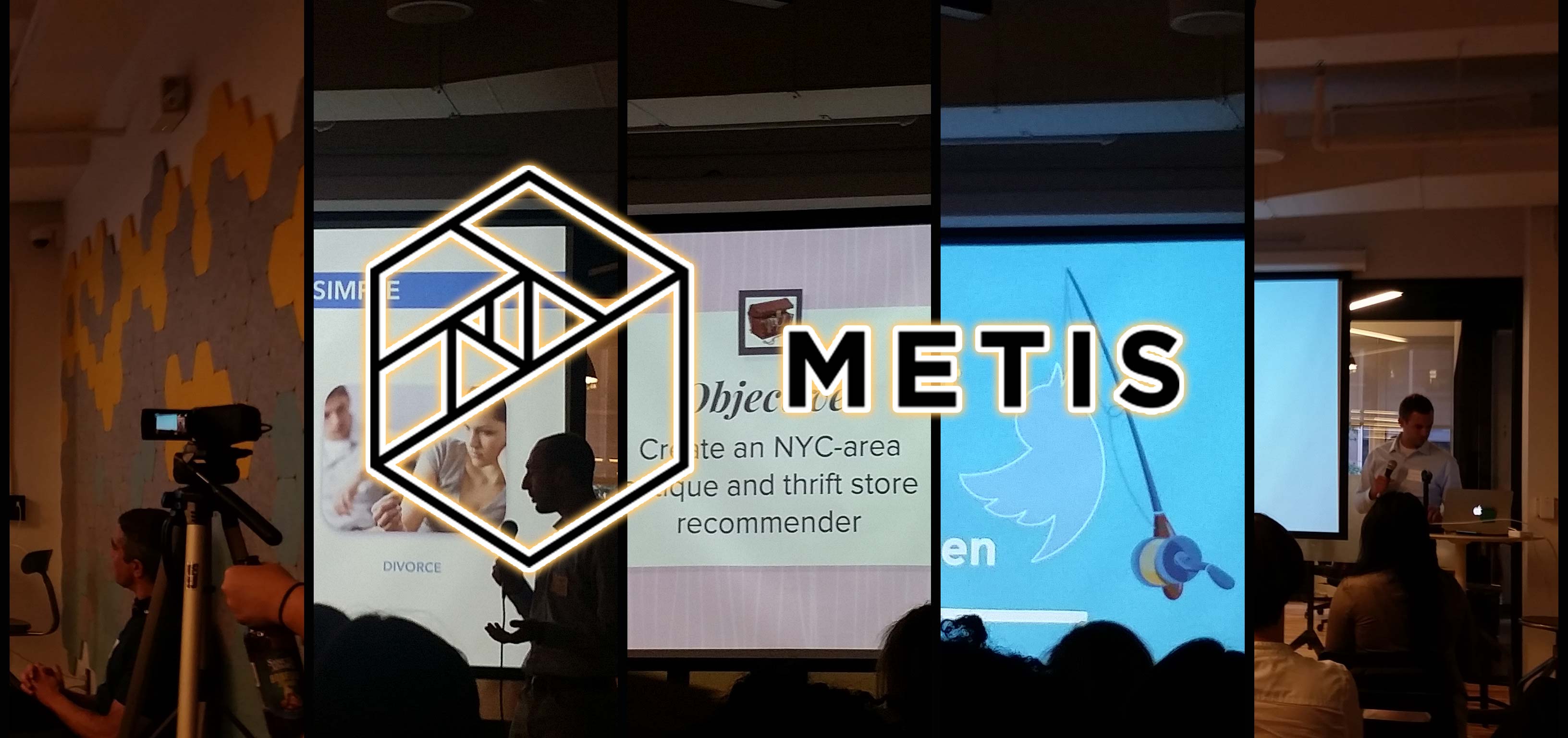
Final Presentations at Metis Career Day
Last night I had the pleasure of attending Career Night at Metis NYC. The main event of the evening was a series of 4-minute final presentations by members of the eighth cohort to complete the flagship 12-week immersive data science bootcamp. Having met the presenters three months ago during the first week of the bootcamp, I was blown away by how much they had learned in this short amount of time. As a whole the presentations were strong, polished, creative, intelligent, and diverse in both methods and topics.
The following is a list of all presenters, links to their Github profiles, and a brief description of the project in order to get a sense of the types of skills one can acquire in this program. As with any bootcamp, what you put in is what you get out of it, but in my (humble, biased) opinion, Metis is the best one out there. Congratulations new graduates!
Presentations
Bryant Biggs developed smartImport, a single package for Python that helps you quickly find the correct library, thematically, by recommendation.
Fernando Hidalgo created tool in d3 to visualize bias and varying topic coverage across multiple international newpapers.
Let's face it: countries have very different biases about what news they report on. #MetisCareerDay pic.twitter.com/HL9hgdWst6
— Metis (@thisismetis) September 15, 2016
Brian Cocolicchio conducted a survival analysis of NFL running backs and found that going pro earlier predicts a longer career.
Jessica Cox made an app to help “treasure hunters” in New York find the right antique or vintage store to fit his/her unique style needs.
Alan Schoen determined predictive factors of tweets retweeted by Don Lemon.
I hope [famous person] responds to my tweets. @alanschoen shares how to boost the odds. #MetisCareerDay pic.twitter.com/crQUiaqYvM
— Metis (@thisismetis) September 15, 2016
Ahmed El-Razi wanted to know whether hip-hop is truly dying, and using NLP clustering determined it was simply becoming more homogenous/ commercial.
Max Farago put his legal training to use by developing Pocket Lawyer, an app that uses Natural Language Processing to serve relevant laws and legal advice to users
Max Farago automates the process of legal advice: e.g "I was pulled over for speeding with marijuana in my trunk" pic.twitter.com/QjniE2msAb
— David Robinson (@drob) September 15, 2016
Seth Kaufman used Natural Language Processing to recommend new music to listeners seeking something different.
Emily Robinson created a web app that dynamically matches data scientists to job descriptions based on skills. Check it out here!
Hey data scientists looking for freelance work! @robinson_es has a solution for you. #MetisCareerDay pic.twitter.com/gMm8c9O2gm
— Metis (@thisismetis) September 15, 2016
Marc Gameroff conducted sentiment analysis on NYC Yelp reviews to see whether he could predict a drop in health inspection results before they happen.
Katherine Pully created Medtracker, a Flask app to track prescriptions and moods for depression that is able to share insights with healthcare providers.
Michelle Gill developed wine-o.ai, an image recognition engine for wine labels. Sign up here!
We're ready to "imbibe intelligently" with @modernscientist wine rec app using computer vision. #MetisCareerDay pic.twitter.com/46cuvgAuCg
— Metis (@thisismetis) September 15, 2016
Kevin Cole developed fantasy football predictions based on social media data.
Sravanthi Ponnana created a personalized hotel recommendation system based on past stays and reviews that integrates into TripAdvisor.
Allison Schlissel scraped paintings from the Met’s collection, then used machine learning to develop recommendations on what to see based on the style and content of other pictures you’ve previously liked
Museums overwhelm you? Allison Schlissel saves you time with her refined and eclectic rec system #MetisCareerDay pic.twitter.com/8aFOf7L8tb
— Metis (@thisismetis) September 15, 2016
Alan Grunwald used machine learning on meeting minutes from the Fed.
Sunne Kuo combined ratings, reviews, and delay data to recommend better flights based on airline quality.
Whitney Chia isolated predictive factors for which funds were most likely to be added next to the S&P 500.
WHAT IF we could predict if a company will get added to the S&P500? Check out Whitney Chia's model. #MetisCareerDay pic.twitter.com/hcpDwnUXMp
— Metis (@thisismetis) September 15, 2016
Adam Levin used PGA golf statistics and machine learning to visualize individuals’ performance over time.
Michael Laster asked, when should a MLB team manager challenge an ump call? and found that it pays to be very aggressive in challenging calls.
Julia Piterbarg scraped the World Bank archives to determine factors that correlate with fraudulent transactions.
The World Bank funds great work. But how we can avoid funding fraud? Yulia Pitarberg shows how. #MetisCareerDay pic.twitter.com/5vG5TWiX5M
— Metis (@thisismetis) September 15, 2016
Matthew Mithell made a Heroku app that personalizes education, and serves assignments based on students’ previous performance.
Graham Anderson made Pilot, a Chrome extension to help users identify ad content.
Is that an ad or content? Let consumers (w/bots) choose the content they want. Graham Anderson at #MetisCareerDay pic.twitter.com/4Mxsf14Cwk
— Metis (@thisismetis) September 15, 2016